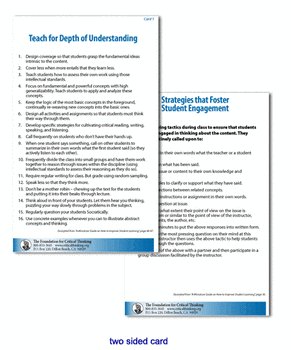January 4, 2018
Dear Colleagues in Critical Thinking:
In my experience, the majority of the best writings on education, and on the relationship between the educated mind and the principles of critical thinking, come from classic writings often forgotten in today's frantic and fragmented world. Consider, for instance, these powerful kernels of wisdom for educators taken from The Great Didactic of John Amos Comenius, originally written in 1628 (London: Adam and Charles Black, 1907):
Everything should be taught thoroughly, briefly, and pithily, that the understanding may be, as it were, unlocked by one key, and may then unravel fresh difficulties of its own accord.
All things that are naturally connected ought to be taught in combination.
... everything that is useless should be invariably discarded. (p. 164)
That the education given shall be not false but real, not superficial but thorough; that is to say, that the rational animal, man, shall be guided, not by the intellects of other men, but by his own; shall not merely read the opinions of and grasp their meaning or commit them to memory and repeat them, but shall himself penetrate to the root of things and acquire the habit of genuinely understanding and making use of what he learns. (p. 82)
Throughout recorded history, enlightened people have struggled with how to improve student learning. To deepen your understanding of education, I recommend the writings of Comenius, an early educational revolutionary and philosopher, as  | |
 | 'The Thinker's Guide Set for College and University Faculty' |
well the established works of other classic educational leaders such as John Henry Newman and, going even further back, Socrates (primarily through the Socratic Dialogues written by Plato and Xenophon) - to name but a few.
 | |
 | Laminated Card: 'Teaching for Depth of Understanding' |
Join Us for the Conference/Call for Proposals
Our Annual International Conference is the world's longest-running conference on critical thinking, and is designed to deepen your understanding of fairminded critical thinking and how to best advance an integrated, robust conception of critical thinking in education and throughout human societies.
We have received a number of Concurrent Session and Roundtable Discussion proposals for our 38th Annual International, and will continue to welcome proposals until February 26. You can see our Call for Proposals here, where you will find guidelines for submitting your own. Through these sessions, we hope to highlight your successes, as well as your struggles, in fostering critical thinking at your institution or elsewhere in your life. Join in our community of learners learning from one another through these important conference sessions.
Register as an Ambassador for Critical Thinking
| |  |
| Returning participant? Consider registering as an ambassador this year.
|  |
We hope all returning conference attendees will sign up as ambassadors for critical thinking when registering for the 38thAnnual International Conference, to be held July 16-20, 2018. As an ambassador for critical thinking you will join us in welcoming newcomers to the conference and be willing to share with them your commitment to advancing fairminded critical thinking, as well as your critical thinking successes and struggles. No specific expertise is needed, only the desire to welcome others as they begin to learn the concepts and principles embedded in a robust conception of critical thinking.
If you have previously attended one of our conferences, in-service workshops, academies, or online courses, click here for information on how to register for the conference as an ambassador.
Thank You for Your Financial Support
We continue to feel honored and gratified by your gifts toward helping us sustain our work and keep our website free from advertisements. Last week, we received a generous gift from one donor who offered these comments:
I have been using your materials for my programs and probably own just about every book in your collection. I work online with students (ages 7 to 75) worldwide teaching writing skills, English grammar, professional publication strategies, literary analysis, and more. "Thinking about Learning" is my business philosophy. Thank you.
Reading the comments that have accompanied your contributions has been one  | |
 | Thanks to your help, critical thinking scholars from around the world can participate in our conferences and courses, and can take what they learn back home. |
of the most gratifying aspects of our work this year. The many people whose lives have been changed through the study of ethical critical thinking, and who have returned to give something back to the movement, remind us of why we carry on with what sometimes seems a daunting mission. We - meaning all of you, too - must never lose sight of the real difference that we together are making in people's lives, and the world at large, every day. Consider giving today, to help us continue our important work.
With gratitude,
Dr. Linda Elder
Educational Psychologist
President and Senior Fellow











